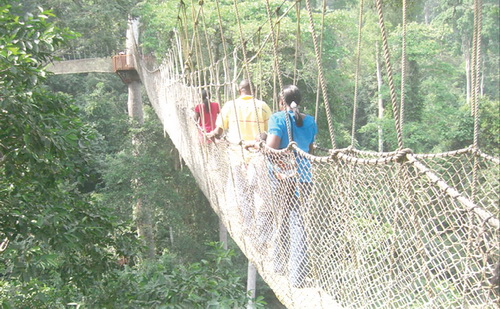![]()
The capacity building approach in tourism
 In spite of its impressive performance over the years, Ghana’s tourism experience aptly describes the hosting paradox. The hosting paradox is defined as a situation in which increasing tourist patronage is associated with a less-than commensurate increase in the collective development status of the host community.
In spite of its impressive performance over the years, Ghana’s tourism experience aptly describes the hosting paradox. The hosting paradox is defined as a situation in which increasing tourist patronage is associated with a less-than commensurate increase in the collective development status of the host community.
Tourist arrivals and receipts
Thus, though tourist arrivals and receipts have, since 1985, increased by some 1166 per cent, repeated empirical findings from the country’s main tourist hub (Cape-Coast and Elmina townships) suggest that there has been very little to show, by way of development, in these towns for the close-to three decades that they have continually hosted tourists.
A hosting paradox can be created by a combination of four context-related situations: skewed power dynamics; poor organisation; a defective tourism operating environment and weak capacities (of both the economy and local residents).
The last of them, capacity-related issues, is the focus of this piece.
Capacity
Capacity, loosely defined, refers to the ability of an entity to perform a particular task. When adapted to the current discourse, capacity can be thought to be a measure of the degree to which the majority of people in a host community can identify and capture benefits from the tourist trade.
Interestingly, many attractions in Africa are mostly located close to rural areas whose characteristics make them have low capacities.
Hence, though tourism provides employment and wealth creation opportunities, the weak or low capacity of people in these host communities makes it difficult for the benefits of tourism to be felt at that level.
The first manifestation of this handicap shows in the fact that the manpower skill level in these areas is generally low and this makes them unable to compete for the existing jobs that tourism may create.
Other capacity-related handicaps come in the form of limited capital and problematic access to credit.
Economic opportunities
Accordingly, they can hardly set up competitive, well-resourced and vibrant businesses through which they can benefit from the provision of goods and services for tourists.
This normally leads to a situation where the economic opportunities associated with tourism development are exploited mainly by more powerful outsiders in cohort with a few local elite, a scenario reminiscent of the workings of the dependency theory.
Consequently, a recent study of the Cape Coast-Elmina area revealed that with the exception of sea food and vegetables, tourism businesses generally purchase majority of their supplies from Accra and Kumasi.
In short, Ghana’s tourism is contextually situated in economically weak areas whose communities are typically poor, have low skills and incomes, produce at a subsistence level, and have difficult access to credit.
Going forward, capacity can be built at two levels. For the individual, this can be done through skill training and providing access to credit to enable them participate beneficially in the supply of tourism.
It is important to ensure that such enterprises are managed professionally and exposed to real, competitive market conditions. The community’s share of the proceeds can then be invested in procuring directly beneficial and tangible social infrastructure which is democratically accessible to all shareholders.
The development of tourism is meaningless unless it translates to real, tangible and decentralized benefits in the host communities.
The benefits of tourism cannot be merely wished into being; they are the outcomes of purposeful planning and policy interventions without which the hosting paradox will continue to entrench itself.
The time is ripe for Ghana to craft and implement an actionable policy geared towards building capacity in host communities.
Gambian example
Research in Gambia has suggested, for example, that crafts, fruits and transportation provide high returns for poor people. The host community can, also collectively earn income by establishing and jointly owning a tourism enterprise.
A good example of this proposition has been found in the success story of the collaboration between the Ghana Heritage Conservation Trust and the Mesomagoro community located at the Eastern fringe of the Kakum National Park.
The writer is a researcher with the Tourism Research and Advocacy Centre (TRAC).
Email: boakye.kwaku @ymail.com
Daily Graphic/graphic.com.gh/Ghana